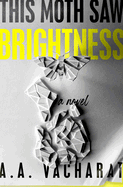
A compassionate representation of autism and mental illness is accompanied by smart, eye-opening commentary on government experiments, conspiracy theories, and even the death of the "American mall" ("the death of humanity" itself) in A.A. Vacharat's debut, This Moth Saw Brightness.
Seventeen-year-old 'Wayne Le has been randomly selected to participate in a "consensual health and nutrition study" at Johns Hopkins University. He must complete daily tasks via an app, wear a wrist monitor, attend a few in-person appointments, and take a pill every few weeks. Then he'll receive a stipend of $200 and a commendation letter proving to his father that he's "a worthwhile human being"--something he hasn't felt like since his mother "ran away... literally screaming." The study soon proves to be more than just medical research, and 'Wayne, his best friend Keshav "Kermit" Shah, and his crush Jane, who is autistic and a fellow study participant, find themselves at the center of a secret government project--or maybe not.
Vacharat's debut YA novel is a compelling dissection of humanity's "impulse to treat... people like they are the property of whoever's in power." She creates engagement through short chapters and inventively uses mixed media (footnotes with quirky details, pop quizzes delivering shocking information, images of screens from the app). These propulsive elements drive the plot while also aiding in forming conspiracy theories about it: Is Jane a plant? Is the app listening in? This unique formatting and 'Wayne's sardonic, self-deprecating voice form the perfect springboard for thought-provoking discussions about the impact of human research projects. An enigmatic, entertaining experience. --Lana Barnes, freelance reviewer and proofreader

